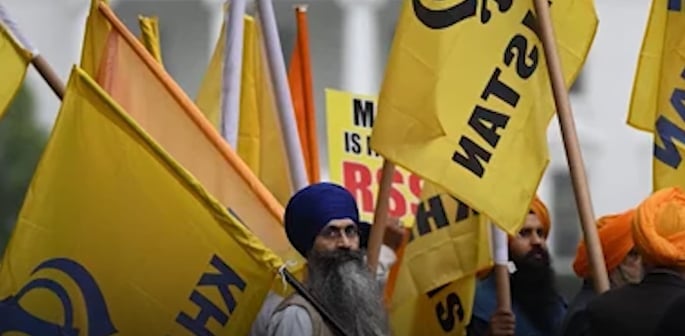“we are seeing India being an emerging [cyber] threat actor.”
Tensions between India and Canada have been mounting for some time over the treatment of Sikh separatists.
Canada is home to the largest Sikh community outside of India and includes activists for an independent Sikh state.
A report by Canada’s Communications Security Establishment (CSE) stated that India was using cyber capabilities “to track and surveil activists and dissidents living abroad”. This is in addition to stepping up cyber-attacks against Canadian government networks.
Ottawa has accused India of orchestrating the 2023 killing in Vancouver of the 45-year-old naturalised Canadian citizen Hardeep Singh Nijjar.
Nijjar was a prominent campaigner for “Khalistan”, the fringe separatist movement for an independent Sikh homeland in India’s Punjab state.
The Indian government views Sikh separatists as a threat to national security and labelled Nijjar a terrorist.
The CSE Chief, Caroline Xavier, in a news conference, stated:
“It is clear that we are seeing India being an emerging [cyber] threat actor.”
The CSE report cited the rift in bilateral relations between Canada and India as “very likely” driving this activity.
The report notes that after Canada’s accusations, “a pro-India hacktivist group” launched crippling DDoS attacks against Canadian websites, including the military’s public site.
The attacks flooded the system with online traffic, making it inaccessible to legitimate users.
On October 29, 2024, officials revealed that Ottawa had traced a campaign targeting Canadian Khalistan activists to the highest levels of Prime Minister Narendra Modi’s government.
The Deputy Minister of Foreign Affairs, David Morrison, confirmed a Washington Post story that implicated the Indian Home Affairs Minister, Amit Shah, in the plot to intimidate and even kill Canadian Sikhs.
While testifying at the House of Commons Public Safety and National Security Committee, Morrison confirmed that he was the unnamed source for the information in the Washington Post story.
The Canadian Prime Minister Justin Trudeau and police have said there are “clear indications” of India’s involvement in the murder.
Canadian officials have stated there is evidence of a broad campaign of intimidation, violence and other threats against Khalistan activists.
India has dismissed the allegations. Nevertheless, Canada is not alone in raising such concerns.
In mid-October, the US Justice Department filed charges against an Indian government employee. Charges were tied to an alleged plot to assassinate a Sikh separatist leader in New York.
In India, the US and Canada have been accused of spreading misinformation to pressure the Indian government. For example, an article by The Sunday Guardian stated:
“The said unprecedented media campaign, which is still being executed by concerned officials, is devised to put pressure on Indian authorities, push them on back foot by alleging that they were carrying out a Mossad and Central Intelligence Agency style assassination operation through the Indian spy agency.”
Both Delhi and Ottawa, earlier in October 2024, expelled the other’s ambassador and senior diplomats.
Diplomatic relations are fracturing further, and the ripple effects continue to manifest.






























































